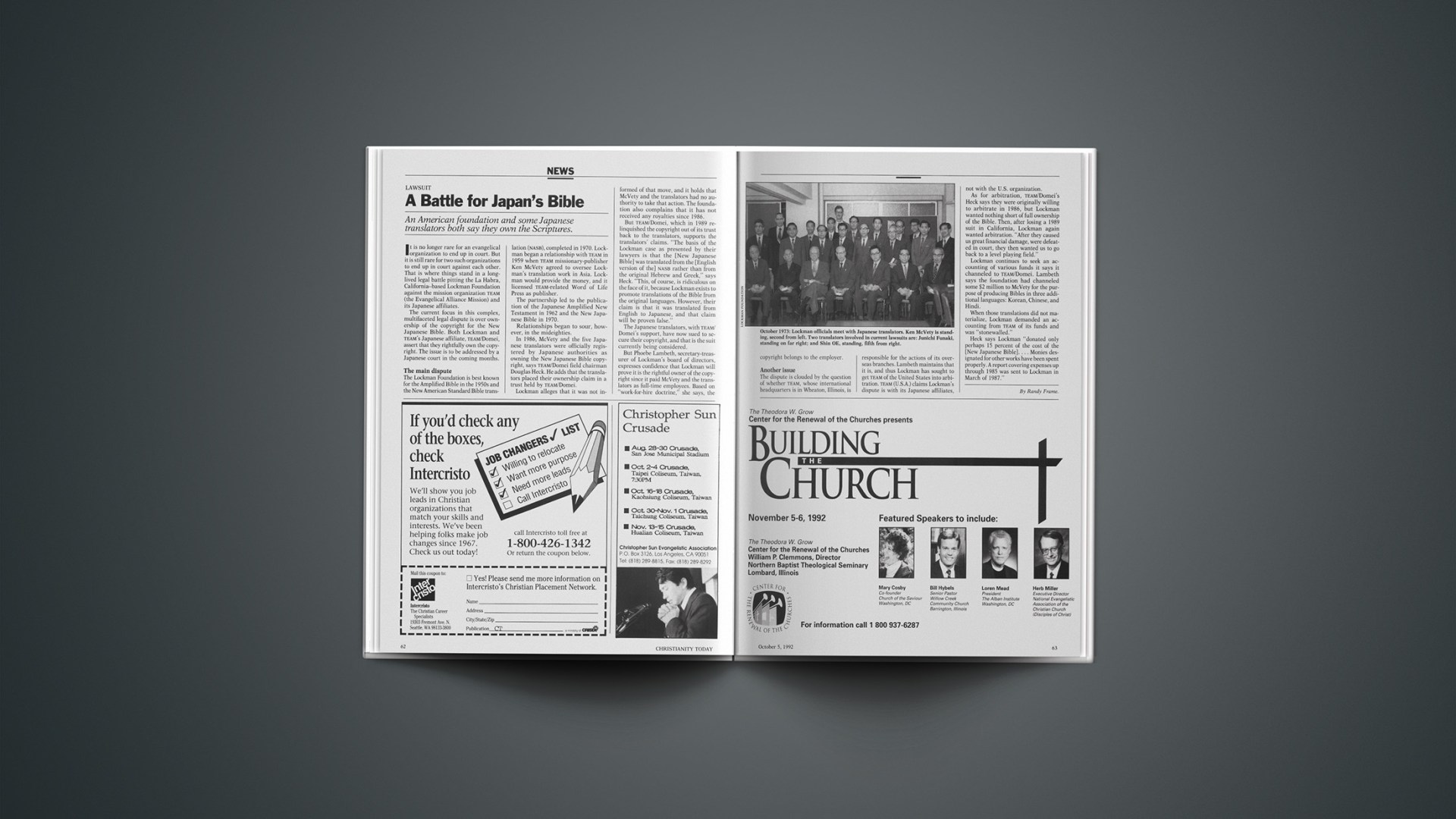An American foundation and some Japanese translators both say they own the Scriptures.
It is no longer rare for an evangelical organization to end up in court. But it is still rare for two such organizations to end up in court against each other. That is where things stand in a long-lived legal battle pitting the La Habra, California-based Lockman Foundation against the mission organization TEAM (the Evangelical Alliance Mission) and its Japanese affiliates.
The current focus in this complex, multifaceted legal dispute is over ownership of the copyright for the New Japanese Bible. Both Lockman and TEAM’s Japanese affiliate, TEAM/Domei, assert that they rightfully own the copyright. The issue is to be addressed by a Japanese court in the coming months.
The Main Dispute
The Lockman Foundation is best known for the Amplified Bible in the 1950s and the New American Standard Bible translation (NASB), completed in 1970. Lock-man began a relationship with TEAM in 1959 when TEAM missionary-publisher Ken McVety agreed to oversee Lock-man’s translation work in Asia. Lock-man would provide the money, and it licensed TEAM-related Word of Life Press as publisher.
The partnership led to the publication of the Japanese Amplified New Testament in 1962 and the New Japanese Bible in 1970.
Relationships began to sour, however, in the mideighties.
In 1986, McVety and the five Japanese translators were officially registered by Japanese authorities as owning the New Japanese Bible copyright, says TEAM/Domei field chairman Douglas Heck. He adds that the translators placed their ownership claim in a trust held by TEAM/Domei.
Lockman alleges that it was not informed of that move, and it holds that McVety and the translators had no authority to take that action. The foundation also complains that it has not received any royalties since 1986.
But TEAM/Domei, which in 1989 relinquished the copyright out of its trust back to the translators, supports the translators’ claims. “The basis of the Lockman case as presented by their lawyers is that the [New Japanese Bible] was translated from the [English version of the] NASB rather than from the original Hebrew and Greek,” says Heck. “This, of course, is ridiculous on the face of it, because Lockman exists to promote translations of the Bible from the original languages. However, their claim is that it was translated from English to Japanese, and that claim will be proven false.”
The Japanese translators, with TEAM/ Domei’s support, have now sued to secure their copyright, and that is the suit currently being considered.
But Phoebe Lambeth, secretary-treasurer of Lockman’s board of directors, expresses confidence that Lockman will prove it is the rightful owner of the copyright since it paid McVety and the translators as full-time employees. Based on “work-for-hire doctrine,” she says, the copyright belongs to the employer.
Another Issue
The dispute is clouded by the question of whether TEAM, whose international headquarters is in Wheaton, Illinois, is responsible for the actions of its overseas branches. Lambeth maintains that it is, and thus Lockman has sought to get TEAM of the United States into arbitration. TEAM (U.S.A.) claims Lockman’s dispute is with its Japanese affiliates, not with the U.S. organization.
As for arbitration, TEAM/Domei’s Heck says they were originally willing to arbitrate in 1986, but Lockman wanted nothing short of full ownership of the Bible. Then, after losing a 1989 suit in California, Lockman again wanted arbitration. “After they caused us great financial damage, were defeated in court, they then wanted us to go back to a level playing field.”
Lockman continues to seek an accounting of various funds it says it channeled to TEAM/Domei. Lambeth says the foundation had channeled some $2 million to McVety for the purpose of producing Bibles in three additional languages: Korean, Chinese, and Hindi.
When those translations did not materialize, Lockman demanded an accounting from TEAM of its funds and was “stonewalled.”
Heck says Lockman “donated only perhaps 15 percent of the cost of the [New Japanese Bible].… Monies designated for other works have been spent properly. A report covering expenses up through 1985 was sent to Lockman in March of 1987.”
By Randy Frame.










